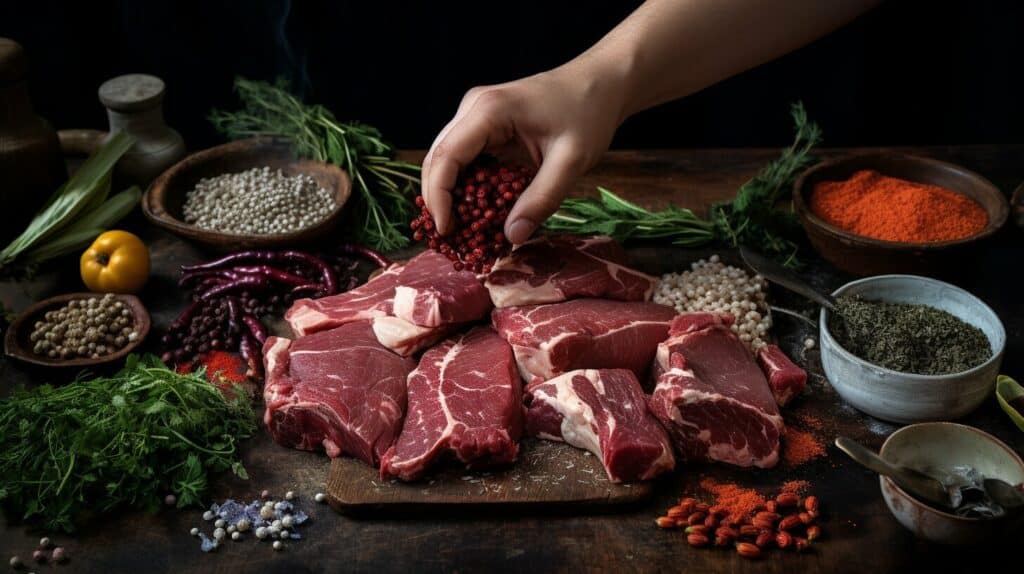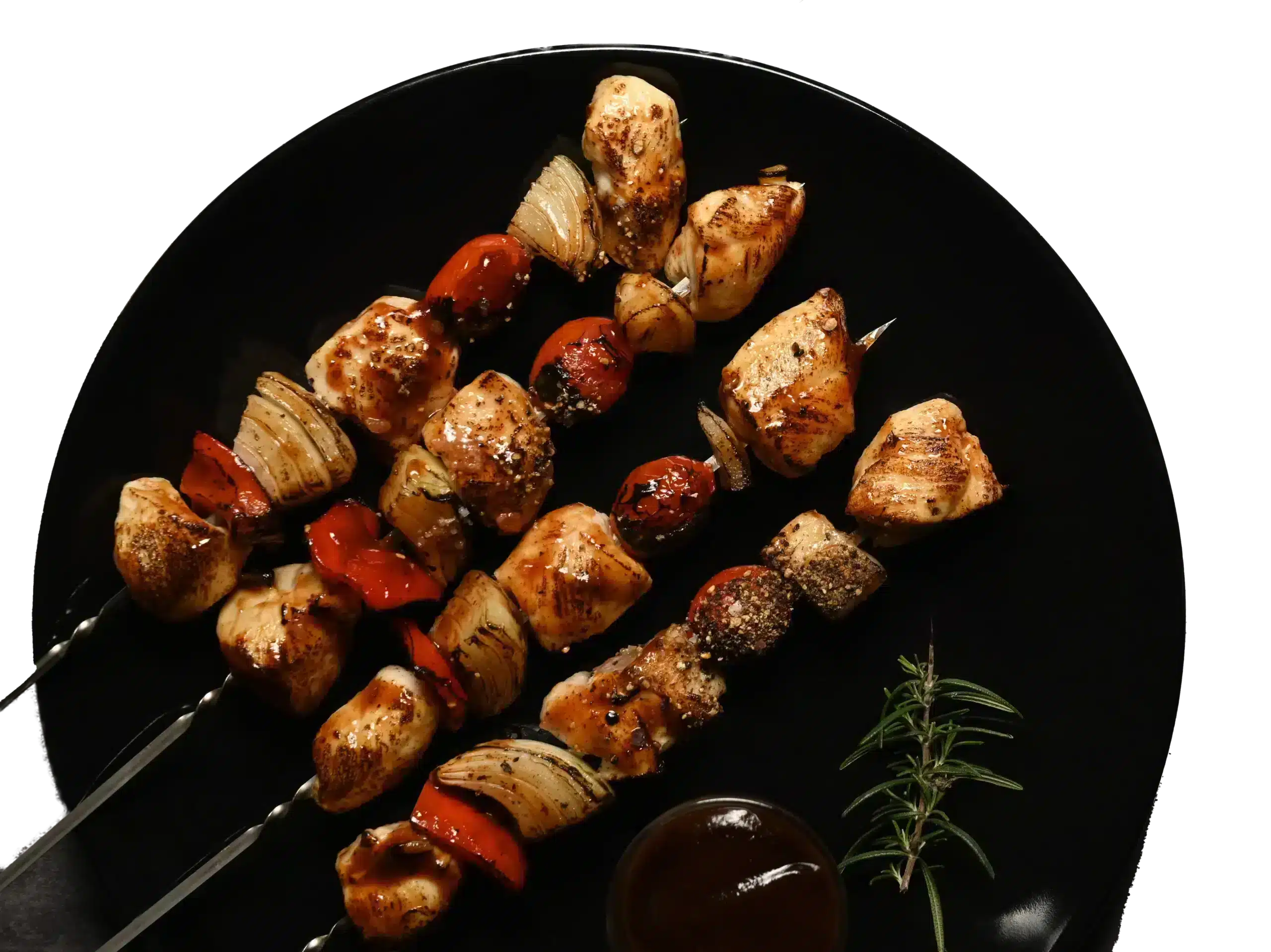
Welcome to the world of marinades, where meat gets transformed into juicy, flavorful goodness. Are you tired of dry and tasteless meats? Look no further! Mastering marinades is the ultimate solution for taking your meat dishes to the next level. In this article, you will discover essential techniques and tips for creating marinades that will tenderize and infuse your meats with delicious flavors.
Whether you’re a seasoned grill master or a novice in the kitchen, our guide to mastering marinades has got you covered. Learn how to choose the right marinade for your meat, prepare your meat for marinating, and incorporate the perfect blend of ingredients to maximize flavor infusion. Our expert tips and techniques will ensure that your meats stay juicy and flavorful on the grill or in the pan, every time.
Get ready to tantalize your taste buds with our collection of marinade recipes that will leave your friends and family begging for more. Don’t settle for mediocre meat dishes when you can master marinades and achieve juicy and flavorful meats every time.
When it comes to cooking meat, marinades are essential for enhancing flavor and achieving juicy, tender results. By allowing the meat to soak in a flavorful liquid, marinades help to break down tough muscle fibers and infuse the meat with delicious aromatics and seasonings. Whether you are grilling, roasting, or sautéing, using a marinade can take your meat dishes to the next level.
Marinades can be made with a variety of ingredients, including acids like vinegar or citrus juices, oils, herbs and spices, and even dairy or fruit juices. These ingredients work together to create a balanced flavor profile that can complement the natural taste of the meat or add layers of complexity.
One of the biggest benefits of using marinades is that they can help to tenderize meat, making it more enjoyable to eat. The acid in marinades breaks down the muscle fibers in the meat, helping it to become more tender and less chewy. This can be especially important when cooking tougher cuts of meat, like flank or skirt steak.
In addition to tenderizing, marinades also infuse the meat with flavor, making it taste more delicious and complex. The flavors can range from sweet and savory to spicy and tangy, depending on the ingredients used. By experimenting with different marinades and flavor combinations, you can discover new and exciting ways to enjoy your favorite cuts of meat.
In summary, using a marinade is a simple yet effective way to achieve juicy, flavorful meats. By understanding the science behind marinades and selecting the right ingredients and techniques, you can take your meat dishes to the next level and impress your family and friends with your culinary skills.

If you want to master marinades, it’s important to understand the science behind them. Marinades work by using acid, oil, and seasoning to tenderize and flavor meat.
The acid, usually from ingredients like lemon juice, vinegar, or wine, breaks down the meat’s proteins, making it more tender. The oil, typically from ingredients like olive oil or sesame oil, helps the marinade stick to the meat and promotes even cooking. Seasonings like salt, pepper, and spices add flavor and enhance the meat’s natural taste.
There are two types of marinades: acidic and enzymatic. Acidic marinades, as explained above, tenderize meat by breaking down its proteins. Enzymatic marinades contain ingredients like pineapple or papaya that contain enzymes that also break down the meat’s proteins, but in a more gentle way. These are often used for more delicate meats like fish or chicken.
| Acidic marinades | Enzymatic marinades |
|---|---|
| Lemon juice | Pineapple juice |
| Vinegar | Papaya |
| Wine | Kiwi fruit |
It’s important to note that marinades should not be left on meat for too long, as the acid or enzymes can start to break down the meat too much, resulting in a mushy texture. A good rule of thumb is to marinate beef and pork for no more than 24 hours, chicken for no more than 8 hours, and seafood for no more than 1 hour.
By understanding the science of marinades and choosing the right ingredients, you can tenderize and enhance the flavor of your meats like a pro.

Choosing the right marinade for your meat is crucial for achieving the best flavor and tenderness. With so many different meat marinades and flavor combinations, it can be challenging to know where to start. Here are some tips to help you select the most suitable marinade for your meat.
The type of meat you’re marinating will greatly impact the type of marinade you should choose. For example, red meats like beef and lamb work well with bold, savory flavors like garlic and rosemary, while poultry like chicken and turkey are better suited to lighter, fruit-based marinades like lemon and orange. Fish and seafood can benefit from acidic marinades like citrus or vinegar-based mixtures.
The way you plan to cook your meat should also influence your choice of marinade. If you’re planning to grill your meat, you might prefer a marinade with more smoky or spicy flavors. On the other hand, if you’re baking or roasting your meat, you may want a marinade that adds sweetness or warmth to your dish.
Don’t be afraid to get creative and experiment with different marinade flavor combinations. Some classic pairings include soy sauce and ginger, balsamic vinegar and honey, or mustard and thyme. You can also try combining different herbs and spices to create a unique flavor profile.
| Marinade Name | Ingredients | Meat Types |
|---|---|---|
| Garlic Herb Marinade | Garlic, rosemary, thyme, olive oil, lemon juice | Beef, lamb |
| Lemon Garlic Marinade | Lemon juice, garlic, olive oil, salt, pepper | Chicken, fish, seafood |
| Balsamic Honey Marinade | Balsamic vinegar, honey, Dijon mustard, garlic, salt | Pork, beef, chicken |
These flavorful meat marinade recipes are just a few examples of the many combinations you can experiment with. Keep in mind that the longer you marinate your meat, the stronger the flavor will be, so adjust your marinade ingredients accordingly. Also, don’t be afraid to try different meats with the same marinade recipe, as this can also result in interesting and delicious flavor combinations.

Before you start marinating your meat, it’s important to take a few preparatory steps to ensure optimal flavor infusion. These marinade techniques will help you achieve delicious and juicy meats every time.
When preparing your meat for marinating, it’s essential to remove any excess fat or connective tissue. These can inhibit the absorption of the marinade and result in tough, chewy meat. Use a sharp knife to trim away any unwanted bits, being careful not to remove too much of the meat.
Before marinating, make sure your meat is clean and free of any debris or contaminants. Rinse the meat in cold water and pat it dry with paper towels. Avoid soaking the meat in water, as this can create a waterlogged texture that interferes with the flavor.
Scoring your meat by making shallow cuts across the surface can help the marinade penetrate deeper into the meat’s interior. Use a sharp knife to make a crisscross pattern on the meat’s surface, being careful not to cut too deep.
The thicker the meat, the longer it will take for the marinade to penetrate. For example, a chicken breast will need less time in the marinade than a whole pork loin. Keep this in mind when planning your marinating time and adjust accordingly.
When marinating your meat, it’s important to use a sealable bag or container to prevent leaks and ensure maximum flavor infusion. A sealable plastic bag works well for small cuts of meat, while a container with a tight-fitting lid is ideal for larger cuts.
To ensure even distribution of the marinade, it’s a good idea to turn the meat frequently while marinating. This will help the marinade penetrate all sides of the meat and create a more uniform flavor.

By following these marinating tricks, you’ll be able to achieve delicious and juicy meats every time. With your meat properly prepared for marinating, you’re now ready to move on to the essential ingredients and flavor enhancers in section six.
When it comes to creating delicious marinades, the right combination of ingredients is key. Not only do marinades add flavor to your meat, but they can also help tenderize tough cuts. Here are some essential marinade ingredients and flavor enhancers you should consider:
| Ingredient | Flavor Profile |
|---|---|
| Acid | Acidic ingredients like vinegar, citrus juices, and wine help tenderize meat and add a tangy flavor. |
| Oil | Oil helps create a barrier that seals in moisture and flavor. Choose a neutral oil like canola or olive oil. |
| Salt | Salt helps break down meat fibers and enhances flavor. Use kosher or sea salt for best results. |
| Herbs and Spices | Herbs and spices like garlic, onion, rosemary, thyme, and cumin add complexity and depth to your marinade. |
| Sugar | Sugar helps balance out the acidity in a marinade and can add a caramelized flavor to your meat when cooked. |
These ingredients can be mixed and matched to create a wide variety of marinade recipes. For example, a classic Italian marinade might include red wine vinegar, olive oil, garlic, and oregano. A sweet and tangy Asian marinade might include soy sauce, brown sugar, ginger, and sesame oil.
When experimenting with marinades, don’t be afraid to get creative and try new things. However, keep in mind that the acidity in some ingredients (such as citrus juices or vinegar) can actually “cook” the meat if left in the marinade for too long. So, be cautious when using acidic ingredients, and follow recommended marinating times.
Here are some additional tips to keep in mind when creating marinades:
With these essential ingredients and tips, you can create flavorful and tender meats that are sure to impress. Try out some different marinade recipes and find your favorites!

Marinading is a powerful technique for adding flavor and tenderness to meats, especially when grilling. In this section, we’ll explore several helpful marinade techniques for optimal flavor infusion.
A key tip to remember is to ensure the meat is fully coated with marinade for the best results. This can be achieved by using a resealable plastic bag or a covered dish for marinating.
Another technique for optimal flavor infusion is to use a meat injector, which allows the marinade to penetrate deeper into the meat. This is especially useful for larger cuts of meat, like roasts and whole chickens.
Brining is also an effective marinating technique that involves soaking the meat in a saltwater solution. This not only adds flavor but also helps to tenderize tougher cuts of meat.
When it comes to grilling, it’s important to consider the type of marinade used. Oil-based marinades are ideal for grilling as they help to prevent the meat from sticking to the grill grates. Acidic marinades, on the other hand, can break down the meat fibers and lead to a mushy texture if marinated for too long.
It’s also important to avoid overcrowding the grill to ensure even cooking and to avoid flare-ups from excess marinade.
When using marinades, it’s important to be aware of the marinating times for different types of meats. For example, chicken can be marinated for up to 24 hours, while seafood should only be marinated for up to an hour to avoid over-marination.
Overall, mastering these marinading techniques will help you achieve optimal flavor infusion and ensure your meats are juicy and delicious every time.

Marinading your meats can make them more flavorful and tender, but it’s important to get the timing and temperature right. Here are some guidelines to help you achieve the best results:
| Meat Type | Marinating Time | Temperature |
|---|---|---|
| Beef | 1-24 hours, depending on cut | Refrigerate between 35°F and 40°F |
| Pork | 1-12 hours, depending on cut | Refrigerate between 35°F and 40°F |
| Poultry | 1-8 hours, depending on cut | Refrigerate between 35°F and 40°F |
| Fish | 30 minutes to 1 hour | Refrigerate between 35°F and 40°F |
When marinating, be sure to keep your meats refrigerated in a covered container to prevent bacteria growth. It’s also best to marinate in the bottom of the refrigerator to prevent any drips from contaminating other foods.
Finally, remember to remove excess marinade before cooking to avoid flare-ups on the grill or in the oven. With proper marinating times and temperatures, you’ll be sure to enjoy juicy and flavorful meats every time.

Grilling is one of the best ways to cook meats, and using marinades can take your grilled meats to the next level. Here are some tips to help you achieve juicy and flavorful meats on the grill:
When selecting a marinade for grilling, choose one that has a balance of acid, oil, and seasonings. Acids like lemon juice or vinegar can help tenderize the meat, while oil helps prevent it from sticking to the grill. Seasonings like herbs and spices add flavor. Be sure to also consider the type of meat you’ll be grilling and choose a marinade that will complement its flavor.
For best results, apply the marinade to the meat at least an hour before grilling. Be sure to coat the meat thoroughly and evenly. For small cuts of meat, you can use a resealable plastic bag to marinate them. For larger cuts of meat, use a glass or plastic container. After applying the marinade, cover and refrigerate the meat until you’re ready to grill.
Using a meat thermometer is crucial when grilling meats. Cook the meat until it reaches the appropriate internal temperature for the type of meat you’re grilling. This will help ensure that it is fully cooked and safe to eat, without overcooking and drying it out.
Basting your meat while grilling can help enhance its flavor and keep it moist. You can use the leftover marinade or make a separate basting sauce with some of the same ingredients from your marinade. Brush it onto the meat during the last few minutes of grilling.

By following these tips and using the right marinade, you can achieve juicy and flavorful meats on the grill that will have your guests coming back for seconds. Happy grilling!
Marinating can be a tricky process, and even the most experienced grillers can run into some common issues. Here are some tips to help troubleshoot and avoid common marinating problems:
| Problem | Solution |
|---|---|
| Meat is Too Tough | Try marinating the meat for a longer period of time, or switch to a tenderizing marinade with acidic ingredients like vinegar or citrus juices. |
| Marinade is Too Salty | Add more liquid to the marinade, or dilute it with water. You can also try adding a sweetener like honey to balance out the saltiness. |
| Meat is Dry | Make sure you are not overcooking the meat, and try basting it with the marinade or adding more oil to the mixture for increased moisture. |
| Marinade is Not Infusing Flavor | Make sure the meat is properly cleaned and scored to allow the marinade to penetrate. You can also try poking small holes in the meat with a fork to enhance flavor absorption, and marinating for a longer period of time. |
Remember, the key to successful marinating is experimentation and practice. Don’t be afraid to try new techniques and flavor combinations to find what works best for you and your taste preferences.

Congratulations! By now, you should have a better understanding of the techniques for juicy and flavorful meats through marinades. Remember, marinades are an essential step to enhancing the flavors of your meats and making your dishes more enjoyable.
By understanding the science of marinades, you can tenderize your meats and infuse them with your desired taste. The key to maximizing the flavor of your meats begins by selecting the right marinade for your meat. Be sure to prepare your meat by cleaning, trimming, and scoring it properly before marinating.
The essential part of any marinade is the ingredients and flavor enhancers you choose to use. Don’t hesitate to experiment with different herbs, spices, acids, oils, and more to find the perfect combination that suits your taste buds.
Marinating techniques like overnight marination, injection, and brining can further help you infuse your desired taste into the meat. Remember to follow the recommended marinating times and temperatures to achieve maximum flavor and tenderness.
When grilling meats, you can use marinades to enhance juiciness and flavor. This is also the perfect time to troubleshoot common problems that may arise during marinating.
Through mastering marinades, you can unlock the secret to juicy and flavorful meats. By using the techniques and tips covered in this article, you can create mouth-watering dishes that are sure to impress your family and guests. Happy grilling!

